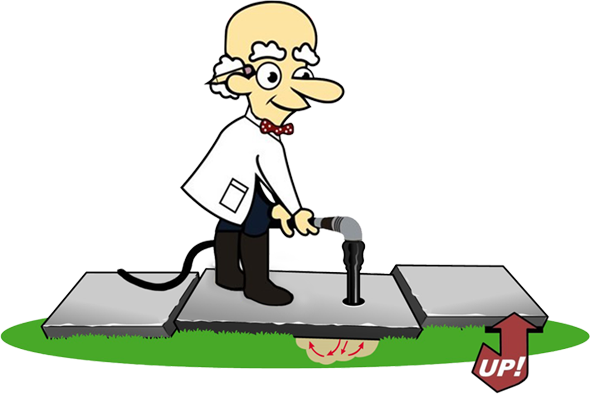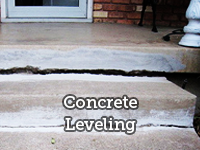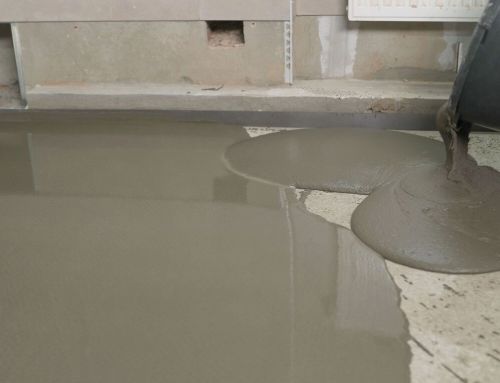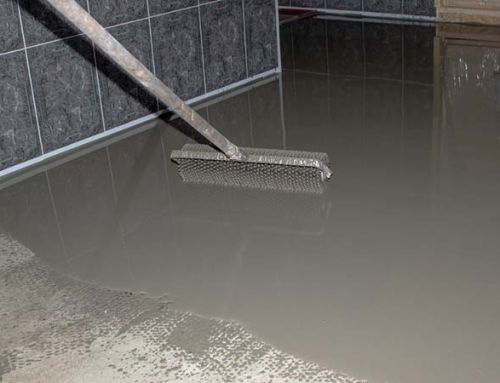IN THIS ARTICLE
Self-leveling concrete can be a time and money-saving alternative to achieve a level concrete floor surface. These floor leveling compounds are often necessary before applying finished floor coverings to your existing concrete floor, such as vinyl plank flooring, hardwood floors, and tile.
Basement floors are hard to install because of limited access. They often have uneven concrete with high areas or dips. Whether you are looking to use self-leveling cement on your basement floor, garage floor, or the concrete slab in your home, this article will help you do a proper assessment to determine if it may be DIY project or if you will need to conduct a search for a local concrete leveling contractor near you for your concrete repair.
Before applying self-leveling underlayment cement, the most important step is determining the cause of the uneven floor surface. Uneven concrete floors are commonly due to two causes:
Improper Installation:
Your concrete floor may have high and low spots from the initial installation. If the contractor or homeowner does not use the proper tools and techniques, the concrete floor can often be uneven.
A Concrete Floor That Has Settled:
Before installing a concrete floor, soil is often moved or displaced. Concrete floor settlement and sinking can occur if the subsoils are not compacted properly. ‘
Before applying self-leveling cement, a settled concrete floor should be inspected for voids, filled, and supported with a concrete leveling method. The most common process is mudjacking, which uses a cement grout slurry mixture. Another method to fill voids with concrete lifting foam is called poly leveling.
If concrete floor settlement is not addressed prior to the application of self-leveling concrete material, further concrete settlement and failure are likely to occur.
Here are some commonly asked questions about self-leveling concrete:
What is self-leveling concrete?
Self-leveling concrete is a cementitious material designed to flow and settle into a level surface on its own without requiring extensive manual leveling or troweling.
How does self-leveling concrete work
Self-leveling concrete contains special additives that improve its flow and self-leveling properties. When mixed with water and poured onto a surface, it seeks its own level, filling in low spots and creating a smooth, flat surface.
Where is self-leveling concrete used?
Self-leveling concrete is commonly used in interior applications such as flooring, leveling uneven or damaged concrete surfaces, and preparing subfloors for the installation of other flooring materials like tile, hardwood, or carpet. If applying self leveling cement on a basement floor, assess the concrete floor surface for pitch prior to application.
What are the advantages of using self-leveling concrete?
Self-leveling concrete provides a quick and efficient way to level and prepare surfaces. It offers a smooth and level finish, is easy to work with, and can save time and effort compared to traditional concrete leveling methods.
Can self-leveling concrete be used outdoors?
Self-leveling concrete is primarily designed for indoor use. It may not perform well in outdoor applications due to exposure to weather and environmental conditions. Also, outdoor concrete is commonly poured with a pitch for drainage.
How do you prepare a surface for self-leveling concrete?
Surface preparation is crucial. Clean the surface thoroughly, remove any debris, dust, or contaminants, and repair any cracks or holes. It’s also important to prime the surface with a suitable primer to improve adhesion. Basement floors should be moisture tested and may require the application of a moisture-mitigating primer.
Can self-leveling concrete be stained or colored?
Yes, self-leveling concrete can be stained or colored to achieve the desired appearance. Stains and dyes can be applied once the self-leveling compound has cured.
How long does self-leveling concrete take to dry and cure?
The drying and curing time can vary depending on factors like temperature and humidity. Typically, it can be walked on in a few hours and ready for other flooring installation in 1-2 days.
Can self-leveling concrete be used for radiant heated floor heating systems?
Yes, self-leveling concrete is often used in conjunction with radiant floor heating systems. The flowable nature of the material ensures good coverage around heating elements
Are there any limitations or precautions when using self-leveling concrete?
It’s important to follow the manufacturer’s instructions, ensure proper surface preparation, and use the correct thickness to avoid cracking. Also, be aware of the product’s pot life, which is the working time you have before the product begins to set.
Remember that the specific instructions and recommendations for using self-leveling concrete may vary depending on the product and brand, so always consult the manufacturer’s guidelines for the best results. If you decide to buy self-leveling cement products and do it yourself, be sure to have extra help on hand and watch videos on how to level a concrete floor prior to beginning the project or purchasing materials.
If you are looking to do a search for concrete leveling contractors near me and live in the Central, Northern, or Southern New Jersey areas, or the Philadelphia, Bucks County, Lehigh County, or Northampton counties of Pennsylvania, contact Concrete Chiropractor for a professional evaluation. We are “The Trusted Leading Experts in Concrete Raising Since 2000” ®.
- Garage Floor Raising and Coating: The Ultimate Guide - June 4, 2024
- Mudjacking Cost: 5 Factors That Affect It - April 10, 2024
- What is The Average Cost of Concrete Leveling in Belle Mead, NJ? - April 4, 2024





